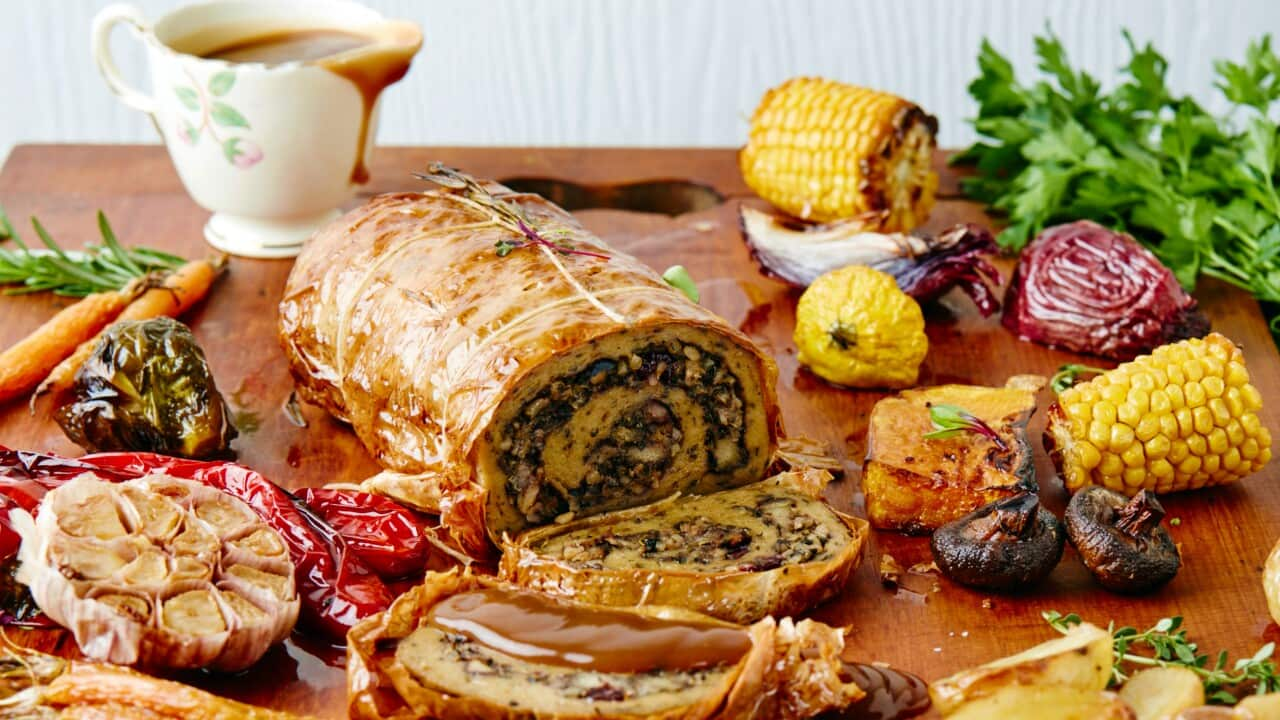Bridget Jones is at a luscious English Christmas dinner spread, at a festive table of obnoxious English acquaintances. Earlier she bumps into Colin Firth, their ‘meet cute’ happens with him dressed in a reindeer jumper at her parent’s Christmas lunch.
Growing up as a Pakistani Muslim girl in western Sydney, this is how I experienced Christmas food - through the world of English literature and Hollywood - a romanticised fantasy of snow and Hogwarts-like feasts of luscious glazed meats, cranberry sauce, puddings, eggnog, cake, bad romcoms and bad jumpers.
As a kid, I remember experiencing a kind of envy at Christmas. My siblings and I would be off school for the summer holidays. Sometimes my family would have picnics or experiment with attempts at western food - masala infused poultry, and mashed potato and veggies that ended up sprinkled liberally with chilli flakes, before patiently waiting for the Boxing Day cricket test and sales.
The chilli-flaked flavouring of our own festive attempts at Christmas feasts, I sniffed at as poor imitations of the real Northern Hemisphere Christmas. In the same way I barely registered the summer inversion of Christmas in Australia - an end of year water and sun-soaked exhalation filled with barbecued prawn, ham and fish, served with brandy pudding and ice-cream.
It was a double dislocation being brown and Australian. Our Christmas was upside down to begin with - hot with seafood, and then further bastardised with masalas. And as always, I was on the outside peering in.
For most Australians, Christmas is celebrated as a cultural secular holiday. It has obvious Desi cross-over appeal – with the shopping, food and glorious Bollywood style bling and lights.
My family refrained from officially celebrating Christmas with the polite distance and veneration reserved by the religious for the mysteries of their rival co-religionists’ traditions. It was a Jesus holiday, they maintained, the Christian Eid for Christian people. And perhaps because it was just less work, there was no attempt at replicating presents, stockings or trees.
I remember feeling resentful at the white kids in the movies getting presents and singing carols. (I was also incredulous at the deception parents inflicted on their kids through fake Santa stories.) My siblings and I would get our Christmas hit driving through the neighbourhood comparing the extravagant front lawn light-displays dotted through our suburb.
It was a double dislocation being brown and Australian. Our Christmas was upside down to begin with - hot with seafood, and then further bastardised with masalas. And as always, I was on the outside peering in.
My Christmas growing up was watching other people’s Christmases on TV. I spent hours watching biblical films with Charlton Heston and remakes of the Ghost of Christmas Past. I memorised American sitcom plot arc variations of the story of the central character (selfish, stressed or materialistic) who learns a life lesson on the true spirit of Christmas (giving and family). My cheesy heart would eat up the earnest morality of these fictional stories, usually ending with a warm and cozy, roast laden spread, with the family members all looking lovingly at each other in warm jumpers drinking eggnog and hot chocolate, in front of blazing fires.
Whenever someone would approach me with a greeting on their lips but pause in hesitation, before the inevitable confused apology of ‘but you probably don’t celebrate right?’ I’d interrupt them with a hearty ‘Merry Christmas!
Later, my Christmas food would involve fast food. I’d usually be the solo staffer on the news desk eating McDonalds. I'd spread myself across the desks, inserting clichés in sad burglary and Christmas retail stories. If any of my colleagues looked at my pityingly, I waved them off, saying ‘aren’t you glad you have me to cover the holiday shift’. I enjoyed the happy and relaxed feeling everyone settled into at the end of year but did experience a pang of exclusion at not being in on the global celebration. Whenever someone would approach me with a greeting on their lips but pause in hesitation, before the inevitable confused apology of ‘but you probably don’t celebrate right?’ I’d interrupt them with a hearty ‘Merry Christmas!'
It was curious of me to link the Northern Hemisphere version as the ‘authentic’ Christmas. I was a minority in Australia. And Australia was the minority in Christmas. It was as if my minority cringe was doubly magnified.
For me it speaks to the power of representation. The more we see ourselves, our cultures and food rituals celebrated, the more we value them. This year, I’ll embrace my unique brown Aussie Christmas-not-Christmas, one that involves biryani, chilling with friends and watching Christmas movies on Netflix. Maybe one day I’ll see myself staring back at me celebrating the Christmas-not-Christmas.
Sarah Malik is the Deputy Editor of SBS Voices. You can follow Sarah on Twitter @sarahbmalik.
This story is the third in a series titled A Festive Perspective, which showcases personal stories of food and culture during the festive season through varying multicultural lenses. The following articles will be published throughout the month of December, 2019. You can read them all .






